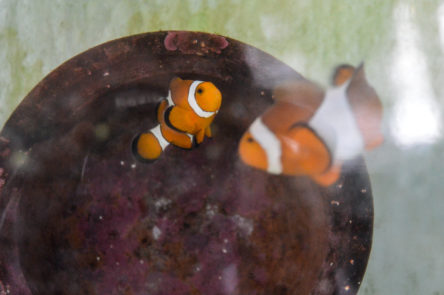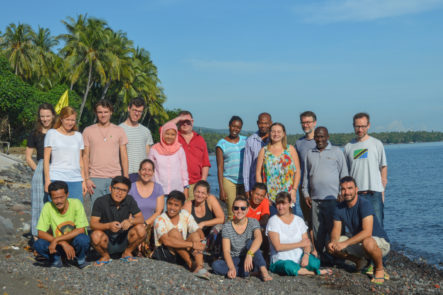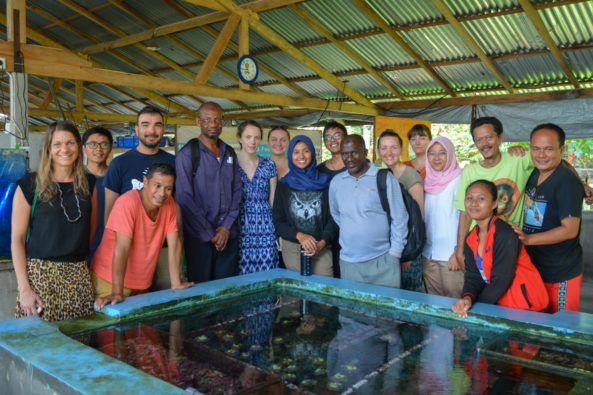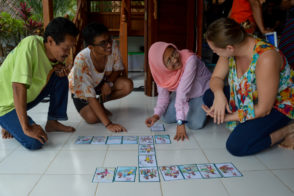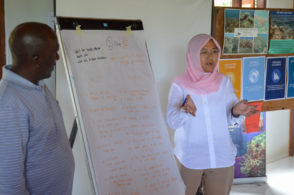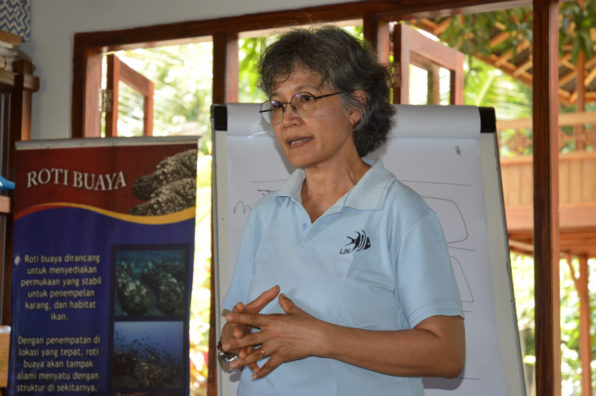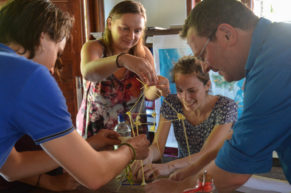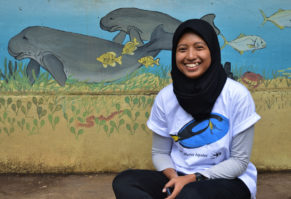A five-day workshop in April brought the far-flung members of Blue Ventures’ outreach team together in Bali, Indonesia, for a unique opportunity to learn from each other and get better acquainted. The outreach team works to support partner organisations in the western Indian Ocean and the Coral Triangle, whose goals and approaches align closely with those of Blue Ventures. Together, we are working to rebuild tropical fisheries with coastal communities.
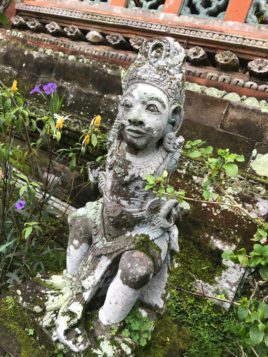
Photo: Laura Robson
Piling into a minibus with nine other people from eight different countries, I was suddenly aware of what a diverse team we are, and what a breadth of cultural backgrounds and experiences were about to collide. Many of us were meeting in person (rather than on a video call) for the first time, and what better way to get to know each other than on a four-hour bus ride to the north coast of Bali! As our bus passed family temples guarded by carved stone statues of Hindu deities and climbed the steep, jungle-lined roads towards Mount Batur volcano, we shared amusing fieldwork stories and discussed what the week ahead might hold.
Of all the possible venues on this vibrant Indonesian island, the little village of Les, on Bali’s northern coast, had been chosen for our workshop for several reasons. Foremostly, an organisation we partner with – LINI – has an aquaculture training facility in Les where staff and community members are trained to breed and raise the endemic Banggai cardinalfish and several species of clownfishes and surgeonfish. There was a bright, airy space in the facility where we could all meet and work together each day, and it seemed the perfect opportunity to see first-hand the inspiring work LINI is doing to employ women from the nearby community, providing them with new skills and an income in an area where employment opportunities are scarce.
Another reason for choosing Les, was that it is always more inspiring to be by the sea, especially for a team that’s deeply invested in the health of our oceans. I certainly wasn’t complaining about the opportunity to start each day with a swim, and on one evening’s snorkel I encountered 18 huge bumphead parrotfish crunching coral just metres from the beach!
On the first morning of the workshop, we were introduced to LINI’s aquaculture programme by Nyka, who provides tours and educational talks for visitors to the centre, and peered into tanks of tiny, just-hatched clownfish. After a quick photo opportunity, it was time to launch into the busy workshop schedule.
Topics covered during the week included: the successes and challenges of implementing fishery closures and locally-led management in Comoros, Tanzania, Kenya, Timor-Leste and Indonesia; principles of good governance and how we can incorporate them into our work; and training sessions on health and safety, monitoring and evaluation, and conflict resolution.
The importance of gender and gender equality in conservation and resource management has become a hot topic in recent years, and a workshop session on this topic provided fascinating insight into the many ways our fisheries management and health-environment programmes intersect with gender. Team members shared stories of the gender-sensitive approaches taken by our teams and partners, for example: by timing fishery closure openings to allow for women who glean on foot to participate; training women as data collectors; and involving women in fisheries learning exchanges.
We had invaluable discussions to identify and highlight gender-related opportunities in the support we provide to our partners, and determined that it would be useful to create a toolbox of gender-sensitive and gender-transformative approaches that our partners can choose to deploy, where relevant, in their work. It’s an exciting theme for future work and one that we hope will broaden the ways in which our work benefits communities.
Team-building exercises included the much-loved ‘marshmallow challenge’, which involved using only 20 pieces of uncooked spaghetti, a metre of tape and a piece of string to build the tallest possible free-standing structure. The structure had to hold a marshmallow at its highest point. We were all amused to see some colleagues become very animated during this challenge, shouting “stabilise! Stabilise!” as they frantically attempted to prevent the collapse of their flimsy structures.
On the final day of the workshop, LINI’s founder and executive director Gayatri Reksodihardjo-Lilley gave us an overview of the origins of LINI and their journey towards empowering communities to manage their marine environment sustainably. LINI’s fishery closure work has sparked interest in neighbouring communities, who now want to implement closures of their own, and we were all inspired by the appetite for locally-led management in Indonesia!
This workshop certainly brought one of Blue Ventures’ organisational values – ‘Valued people, effective teams’ – to the fore. These five days strengthened the bonds within the outreach team, helped us to better understand each other’s work and started invaluable conversations around how we can support each other. Although we work in a wide variety of cultural, socio-economic and environmental contexts, many of the challenges we face are the same. As a more cohesive team that has worked, played and laughed together, we can only be more effective in working towards the mission that Blue Ventures and our partners share – to rebuild tropical fisheries with coastal communities.
Read an interview with Gayatri Reksodihardjo-Lilley and discover how LINI is creating the next generation of ocean advocates in Sulawesi


